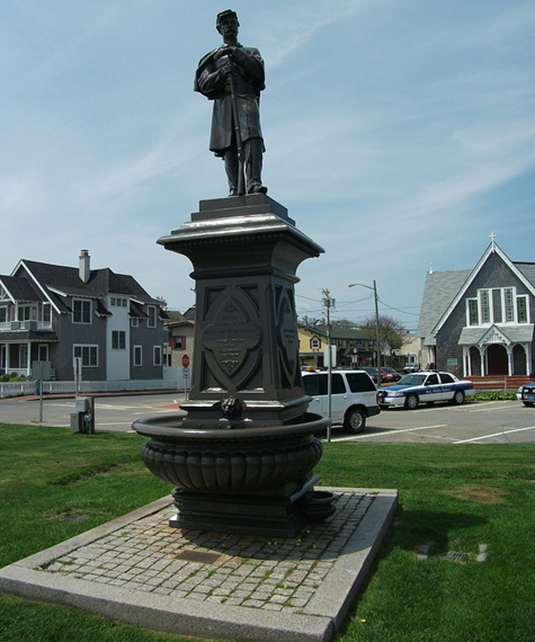A Certain Sanity
AJ Robinson

Tribute Statue to Confederate Veterans
erected on Martha's Vineyard by Union Veterans.
These days, there's much talk of statues. Specifically, we're debating the place of statues that honour heroes of the Confederacy in modern American society. Some say they pay tribute to our history and that to remove them is to attempt to erase a chapter from our past.
What is just-cause to remove historical statues?
What those that say statues are tributes argue that doing so is a slippery slope. What's next, we pull down Washington and Jefferson because they were slave owners? Some leaders of the civil rights movement were less than perfect; do we have just cause to remove their icons of stone and metal?
For myself, I see that as a false equivalence. We can remember the people without the symbols. I don't advocate erasing them from the history books, merely relegating them to a less prestigious position.
My dad fought in World War II. He didn't much care for General Patton or Field Marshal Montgomery. He felt the former too reckless and the latter too cautious.
My father did admire Field Marshal Erwin Rommel, the German. My father felt Rommel was a brilliant leader and tactician. Yet, there is no way he would ever advocate putting up any sort of monument to him or any other German general, most especially in the USA.
In a similar vein, I wouldn’t want to see statues of Benedict Arnold or General Cornwallis dotting the landscape of our cities. So, what makes Lee and the other losers or traitors of the Confederacy worthy of such recognition?
In Oak Bluffs, on the island of Martha's Vineyard, there is a very special statue. Erected many years ago, back in 1891, it honours the men, of the island, that fought in the Civil War. Here's the ironic aspect to it: the money to build came from a southern veteran, Charles Strahan, of Company B, 21st Virginia Regiment.
As a retired confederate soldier, Strahan moved to the Martha’s Vineyard some years after the war. He published the Martha’s Vineyard Herald. He raised the money for the statue, $2,000, which in 1891 was a considerable sum. He used the income from newspaper subscriptions, which he sold to the residents.
Strahan said it was his way of healing the old wound. Some say it was his way of making amends to the Union veterans, of the island, that shunned him for being a southerner. The plaque he had made for the pedestal made it clear the statue honoured the Grand Army of the Republic; the rand and file soldiers of the north.
Forgive, if not to forget.
Then, years later, in 1925, after he’d passed away, the surviving Union veterans on the island re-dedicated the statue to the Confederate soldiers and placed a second plaque on its base. It states, “The chasm is closed.
“In memory of the restored union, this tablet is dedicated by Union veterans of the Civil War and patriotic citizens of Martha’s Vineyard in honour of the Confederate soldiers.”
The statue has moved around Oak Bluffs several times: downtown, near city hall and Ocean Park. Its paint was a plain blue or dull grey most of the time. For a while, it was in detailed colors, even flesh tones.
At one point, after its first move, it fell over and damaged. An island plumber fixed the head and hand d. To this day, it remains the only statue dedicated to the soldiers on both sides of that terrible war. It’s not for Grant or Lee; even for Lincoln. No, it honours the true heroes of that bloody conflict: the common foot soldiers.
This statue symbolises the essence of America.
If you want to see a monument that truly symbolizes the healing and unity of America, go to Oak Bluffs and pay your respects. The journey, the pilgrimage is well worth it, especially in our fractured times. This is a simple message. I hope it inspires you and our nation to close chasms that divide.
Combining the gimlet-eye of Philip Roth with the precisive mind of Lionel Trilling, AJ Robinson writes about what goes bump in the mind, of 21st century adults. Raised in Boston, with summers on Martha's Vineyard, AJ now lives in Florida. Working, again, as an engineeer, after years out of the field due to 2009 recession and slow recovery, Robinson finds time to write. His liberal, note the small "l," sensibilities often lead to bouts of righteous indignation, well focused and true. His teen vampire adventure novel, "Vampire Vendetta," will publish in 2020. Robinson continues to write books, screenplays and teleplays and keeps hoping for that big break.
Click above to tell a friend about this article.
Recommended
- David Simmonds
- The Unknown Saviour
- The Phase Phase
- Three Takeaways

- Sjef Frenken
- Blackitude
- The Truth Unveiled
- Je Regrette

- Jennifer Flaten
- Let's Go to the Movies
- Sump Pump
- Meeting Neighbours

- M Alan Roberts
- Sea Stories 3
- Fired Up
- A Loveless Life

Recommended
- Matt Seinberg
- Tax Season 2012
- Starr Trekking
- Radio Formats

- Streeter Click
- The Cute Beatle
- Mission
- The Real Don Steele

- JR Hafer
- Larger Numbers
- Alison Steele
- Scott Muni

Recommended
- AJ Robinson
- No Debate
- Does He Know
- No Future in History

- Jane Doe
- Speak Now
- Buying an Amp
- Born to Run

- M Adam Roberts
- A Father's Heart
- The Great Lie
- Humble Pie

- Ricardo Teixeira
- The Unicorn
- The Future
- There is a Light



